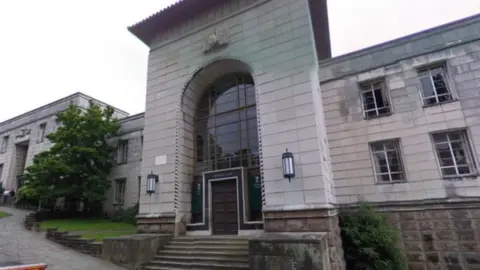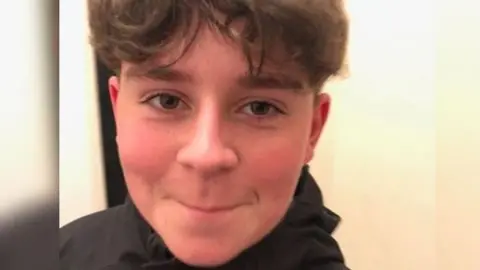Coronavirus: Inquests halted after row over private hearings
 Google
Google Inquests in the Gwent area have been halted after a coroner was accused of holding them in private during the coronavirus pandemic.
Six inquests were allegedly held, including that of Carson Price, 13, of Caerphilly, who died after taking ecstasy.
News agency PA Media said it contradicted "principles of open justice".
Senior coroner Caroline Saunders said the allegations were "offensive".
By law, inquests, which are not to find blame, but to find out how someone died, are required to be held in public.
Due to the coronavirus restrictions many coroners' courts across Wales are not operating.
At the start of April, the Gwent coroner's office, which deals with cases from the court in Newport, contacted journalists proposing inquests resume from the middle of the month, in a bid to try and deal with a backlog of cases.
The coroner said it would only be for inquests where it was felt witnesses were not needed or where the family did not wish to attend, and the summing up and conclusions would be shared with media afterwards.
Later, the office contacted media organisations saying it only had the resources to send out a "record of inquest", which includes relatively few details about a death.
 Family Photo
Family PhotoPA Media's legal editor Mike Dodds said holding the hearings in private was "unlawful".
In a letter sent to Ms Saunders he said the lack of access for the media, "acting as the eyes and ears of the public", contradicted the "fundamental principles of open justice".
He said while PA had "considerable sympathy" for the coroner service, and the desire to avoid delays and upset for families, the media had been given no notice of Carson's inquest, which was of "considerable public interest".
"The public interest in open justice and proper reporting of inquests has to be considered - and is arguably even more important during the current crisis - and cannot simply be discarded for reasons of administrative convenience."
Mr Dodds said courts had arranged for journalists to access hearings virtually, and it was surely possible for arrangements to be put in place for journalists to be able to dial in to inquests.
"We trust that your office will make fresh arrangements to ensure that all inquest hearings take place in public, with media organisations allowed access, even if it has to be by remote means, so that they can report them properly," he wrote.
But in a reply Ms Saunders said she did not need a lecture about the principle of open justice.
"When I first embarked on the consultation with families and the press in relation to what would be acceptable, I acknowledged that this principle would be diluted but wanted to try to maintain an inquest service to avoid the problems set out above," she said.
She added: "You will, no doubt, be relieved to know that I have acknowledged the voracity of your argument and have therefore adjourned all of the inquests listed from today onwards until the restrictions imposed by the pandemic have been lifted.
"I would ask you to reflect on the consequences; one lady has been told today that her mother's inquest will now not proceed as planned tomorrow because of the concerns raised by the press. She is devastated"
It is not known when inquests in the area will continue.
